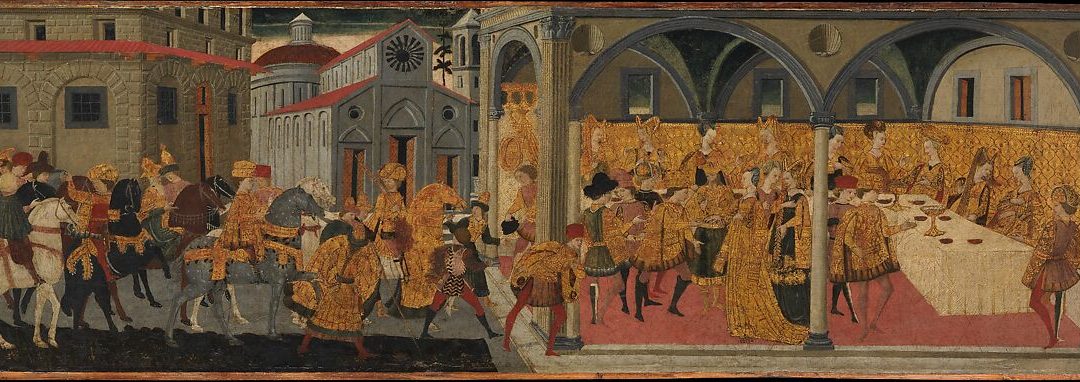“For since ‘God is love,’ he who loves love certainly loves God; but he must needs love love, who loves his brother.” ~ Augustine, On the Holy Trinity, Bk. 8, Ch. 8
Contrary perhaps to a first glance, Augustine isn’t waxing redundant. If God is love, it certainly follows that this love must be loved more than anything or anyone else. It is a love that must be adored, pursued, and even worshiped.
In 1 John 4:8, the apostle writes, “He who does not love does not know God, for God is love.” And again in v. 16, “And we have known and believed the love that God has for us. God is love, and he who abides in love abides in God, and God in him.” These two substantive clauses identify the perfection of love with God Himself. To put it more technically, the divine essence just is love, according to the apostle. Hence, as Augustine observes, this love must be loved. This love must be loved and adored above all else — for God is love.
But this causes a dilemma for those who would deny the identity of divine love with the divine itself. If love in God is God, this love must be worshiped. If love in God is not God, it must not be worshiped.
Let me try to explain…
The Doctrine of Divine Simplicity
The doctrine of divine simplicity (DDS) states that God is not composed of parts. Any parts. No really… there are no parts in God. Zip. Zero.
To put the doctrine of divine simplicity in the words of Herman Bavinck, “But in God everything is one. God is everything He possesses. He is his own wisdom, his own life; being and living coincide in him.”[1] To use the title language of James Dolezal’s helpful book, All That is in God Is God. The Second London Confession (1677) expresses the doctrine as follows, “The Lord our God is but one only living and true God; whose subsistence is in and of himself, infinite in being and perfection; whose essence cannot be comprehended by any but himself; a most pure spirit, invisible, without body, parts, or passions, who only hath immortality, dwelling in the light which no man can approach unto…” (2LCF 2.1; emphasis added)
According to DDS, any kind of partition or parthood in the divine essence must be denied. If mereology is the “study of parthood,” God does not have a mereology. Dolezal defines a “part” as “anything that is less than the whole and without which the whole would be really different than it is.”[2] Stephen Charnock expresses the same point, “the compounding parts are in order of nature before that which is compounded by them… If God had parts and bodily members as we have, or any composition, the essence of God would result from those parts, and those parts be supposed to be before God.”[3] In other words, if God had parts those parts would make Him who He is. He would be, in a sense, caused. To put it another way, God would depend on that which is more basic than Himself to be Himself. In sum, God would not be God if He were not simple.
Love in God, therefore, must not be thought to be anything other than God Himself. Hence, 1 John 4:8, 16, “God is love.” Love is not something God “has.” Love isn’t something God participates in with other beings. It’s not something more basic than Himself making Him to be what He is and without which He would be different.
The Dilemma of Denying the DDS
If God is love, we must love love, as Augustine observes above. But this means that the divine essence (God Himself) and love as it is in God must be the same. If this love were not God, it would be a gross error to love love as the highest good. It would be unthinkable to love, adore, and worship that which is not God Himself. To worship what is not God is to commit idolatry according to the first and second commandments. (Cf. Ex. 20) Thus, either love in God just is God, or it is not God. But if it is not God, it cannot be loved as the highest good, adored, and worshiped.
A denial of DDS (as stated above) would seem to imply a real distinction between God’s essence and the love that exists in God. But if this is the case, to worship and adore the love that is in God would be idolatry. Furthermore, the twin substantives in 1 John 4, i.e. “God is love,” would be nothing but poetic, if not hyperbolic, expressions. But this doesn’t seem likely given the identification of love with knowledge of God in v. 8. Nor would v. 16 easily permit flexibility in the language since it identifies the act of abiding in love with the act of abiding in God Himself, “And we have known and believed the love that God has for us. God is love, and he who abides in love abides in God, and God in him.” Abiding in love just is to abide in God, but this would not necessarily be the case if love and God were really different “things.”
The denial of classical DDS seems to encounter a dilemma — worship love or not. If love is not God, it would be a sin to worship it. If love is God, it would be a sin not to.
Resources:
[1] Herman Bavinck, Reformed Dogmatics, vol. 2, (Grand Rapids, MI: Baker Academic, 2004), 174.
[2] James Dolezal, “Still Impassible: Confessing God Without Passions,” in Journal of the Institute of Reformed Baptist Studies, 132.
[3] Stephen Charnock, The Existence and Attributes of God, vol. 1, (Grand Rapids, MI: Baker Book House Company, 1979), 186.

